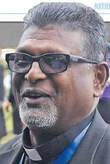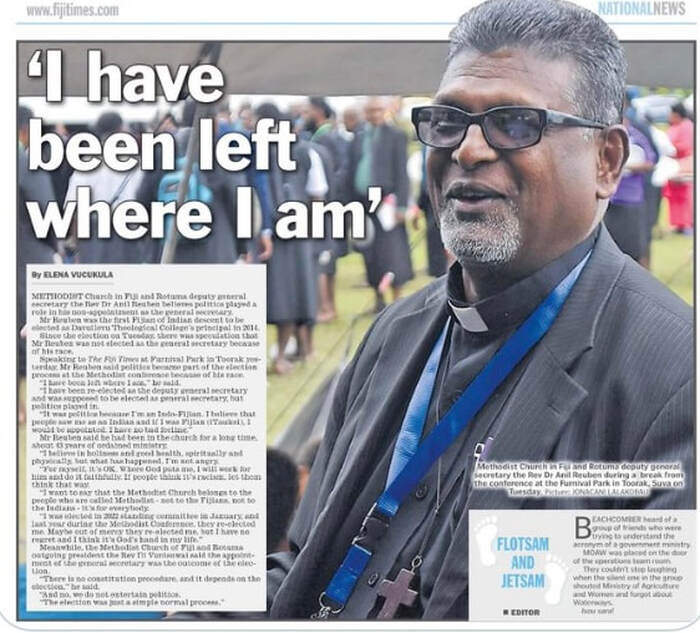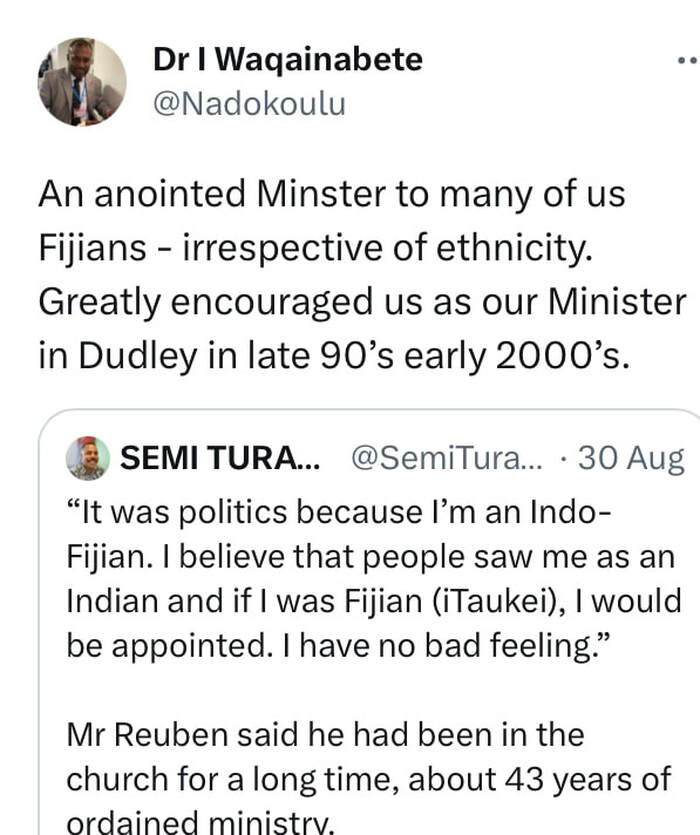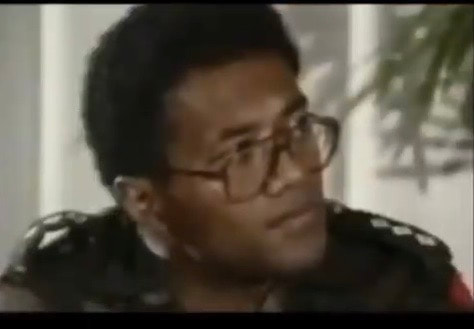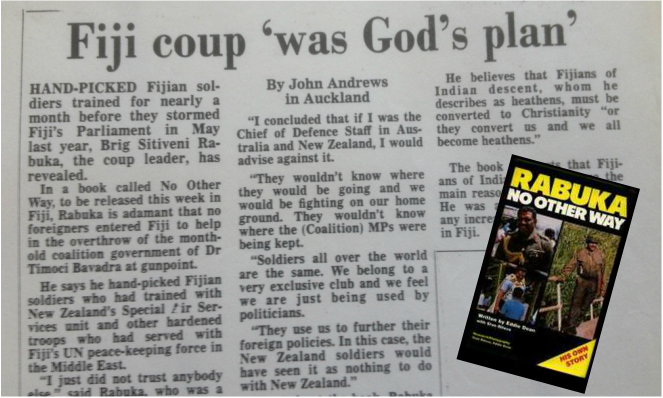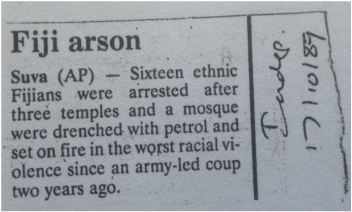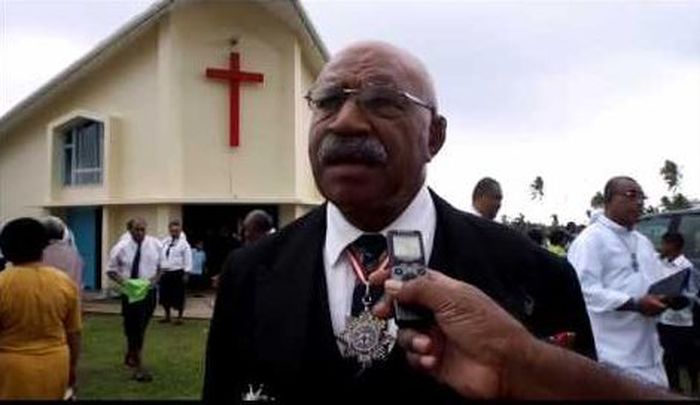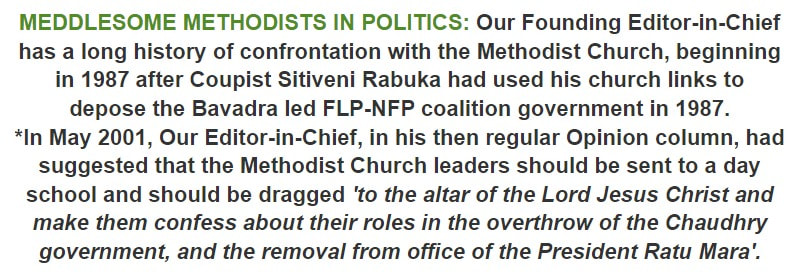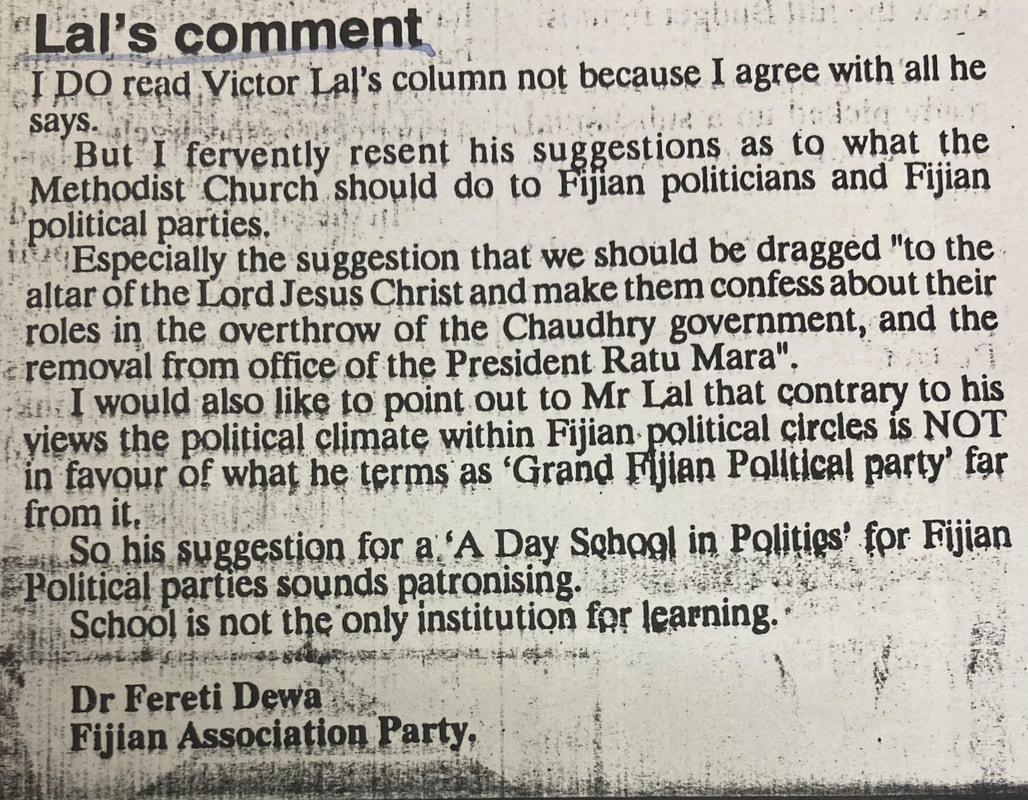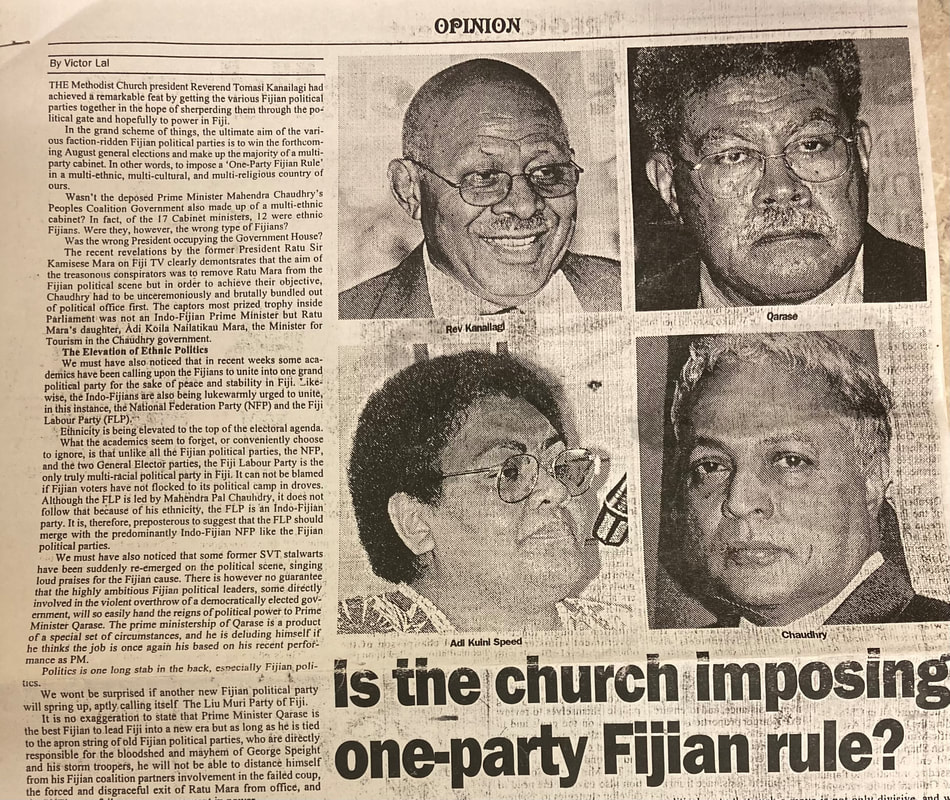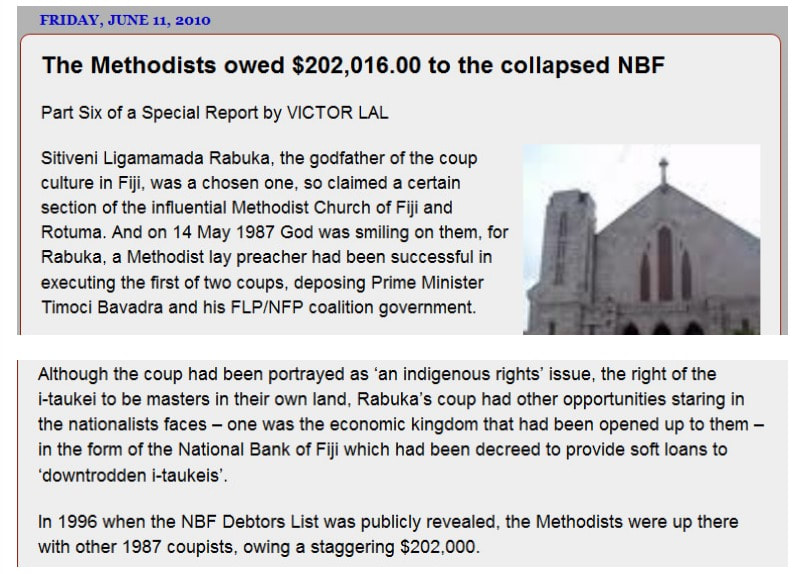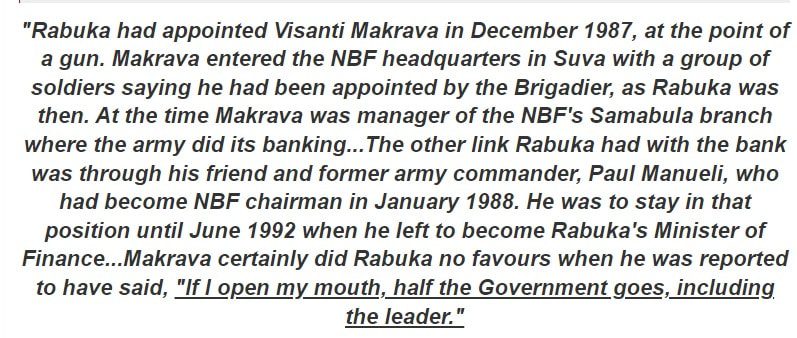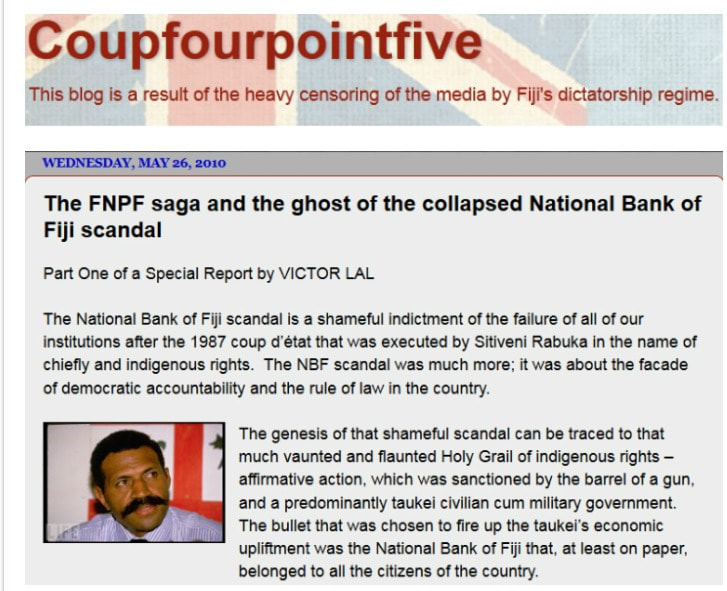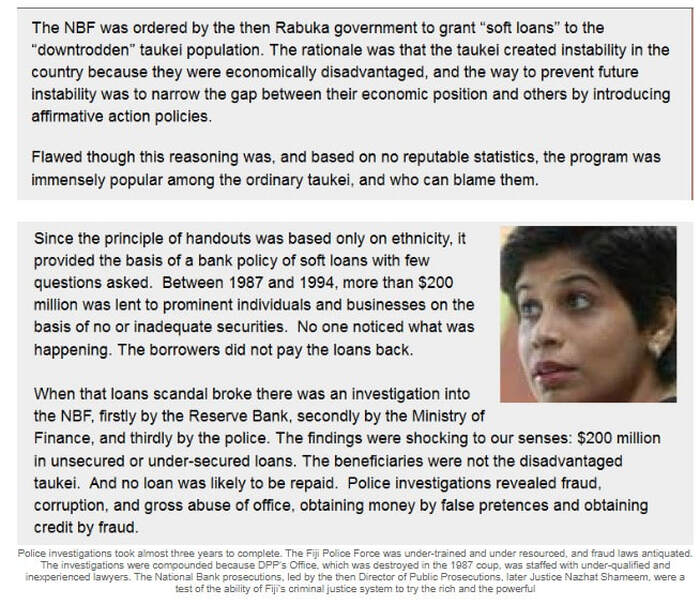The 'Tagi ni i-Taukei' sermon must be smashed to smithereens
The Rotumans cannot and must not be allowed to stand in the front queue, ahead of the Reverend Anil Reuben who has dedicated over 43 years of his service to the Methodist Church of Fiji and Rotuma.
RABUKA'S 1987 METHODIST RACISTS are back in full GLORY:
From Fijileaks Archives
SITTING IN JUDGMENT IN THE FIJI COURT OF APPEAL TODAY
We were shocked to learn of this 1987 RACIST back as a JUDGE in Sitiveni Rabuka's Coalition government
"Some other bogus nationalist taukeis would later crawl out of the shadows, among them Isikeli Mataitoga, a legal officer under the Director of Public Prosecutions and a Captain in the Territorials. He is today ensconced in the Foreign Ministry, charged with making the world understand another coup – “Frank’s 2006 Coup”. Looking back at the 1987 television tapes from Britain’s Channel Four television, in which he (a spokesman for Rabuka) and I prominently featured during the 1987 coups on the opposite sides of the racial divide, I had asked one forthright question:
“How many generation does it take for one to become a native?”
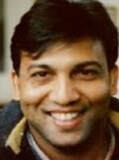
“Sit down everybody, sit down. This is a takeover. We apologise for any inconvenience caused. You are requested to stay cool, stay down, sit down and listen to what we are going to tell you. Please stay calm, ladies and gentlemen,” announced a man cowardly hiding behind a mask. Another man who was sitting down quietly in the public gallery soon joined the masked man: “Mr Prime Minister, please lead your team down and remain calm. Mr Prime Minister, Sir, will you lead your team down to the right…”
One Captain X (Isireli Dugu), and a 38-year-old Lieutenant-Colonel Sitiveni Rabuka, twenty years ago, at 10am on 14 May 1987, spoke these treasonous words as a “hit squad” of ten soldiers toppled Dr Timoci Bavadra’s NFP/FLP Coalition government in the first military coup in the South Pacific.
As the parliamentarians were being detained, one Cabinet minister Dr Tupeni Baba, related to Rabuka, naively but defiantly, shouted, “What kind of a joke is this?” What was being played out in Parliament was no joking game; it was part of a fulfilment of an obnoxious prayer, “The Tagi ni Taukei – Cry of the Taukei”, that had been earlier recited in the home of Methodist Church minister (once the head of the Methodist Dilkusha Indian Circuit), Reverend Tomasi Raikivi, a cousin of Rabuka’s: “Save us, and save our land. You saved the Israelites, when foreigners took their land from them. Dear God, please answer our prayer and do the same for us. Amen”.
Although the prayer ended with “Amen”, what should have been intoned was “Amin” – for the plan was to hunt and hound out fellow Indo-Fijians like Idi Amin did in Uganda.
The other so-called “Man of God” beseeching his Heavenly Lord for guidance was Ratu Inoke Kubuabola, a cousin of the late President Ratu Sir Penaia Ganilau. Kubuabola was President of the Fiji Council of Churches and Secretary General of the Bible Society of the South Pacific. It was Kubuabola, who had first termed the extreme Fijian nationalist organization that had sprung up following Dr Bavadra’s election victory as the Taukei Movement, and he was its direct link with Mr Rabuka leading up to the coup.
The two men of the robe were not alone. At the prayer meeting were others, who would later carve out respectable standing and careers from the debris of the 1987 coups: Ratu Finau Mara, the son of the late President Ratu Sir Kamisese Mara; Ratu George Kadavulevu, son of the Paramount Chief of Fiji, the late Ratu George Cakobau; Ratu Keni Viuyasawa, the brother of Brigadier Ratu Epeli Nailatikau; Daniel Veitata, Apisai Tora, the late Jone Veisamasama, Qoriniasi Bale and Filipe Bole. There were other countless and faceless chiefs, thieves, and others who were part of Rabuka’s Operation Kidacala (Surprise) plan to seize power.
Some other bogus nationalist taukeis would later crawl out of the shadows, among them Isikeli Mataitoga, a legal officer under the Director of Public Prosecutions and a Captain in the Territorials. He is today ensconced in the Foreign Ministry, charged with making the world understand another coup – “Frank’s 2006 Coup”. Looking back at the 1987 television tapes from Britain’s Channel Four television, in which he (a spokesman for Rabuka) and I prominently featured during the 1987 coups on the opposite sides of the racial divide, I had asked one forthright question: “How many generation does it take for one to become a native?”
I had angrily pointed out to the world television viewers in 1987 that most of those running around beating up Indo-Fijians and claiming to be “indigenous” were themselves “bloody foreigners” – from outer islands of Fiji, from Lau and Bau, which are not connected to the mainland, and from Vanua Levu. “These Fijians have been the cause of all our racial and political problems on the mainland which houses the Parliament. Just look at the western division of Viti Levu – a model of peaceful existence to be emulated by the world.”
Of course, it was an exaggeration to blame all the so-called “bloody foreigners”, but the backgrounds of most of the key players surely pointed to in that direction, except maybe for the backgrounds of Apisai Tora, Sakiasi Butadroka, and the assistant Roko Tui Naitasiri, Ratu Meli Vesikula. An examination of the key players in the 1987 coups does reveal that the majority had come from Navatu-Natewa in Vanua Levu. Dr Baba later observed: “A lot of them, when we were released, took off their masks and came over and actually shook hands with me. They come from my part of the island.”
“They arrive on the mainland of Viti Levu, and in order to stay put, raise the chant – the Cry of the Fijians”, I told Channel Four and BBC television viewers. Their principal target has always been Indo-Fijians, as expressed by coup executioner Rabuka, I said.
"Just listen to his racist nonsense about his coup: “It was a matter of cultural survival. Sink or Swim. There was no way we were going to go down. The Indians had become an unbearable presence in Fiji. The Hindus and Muslims are pagans who must be converted to Christianity.” We could say the same about him and other non-Viti Levu born Fijians, I told BBC: “Send these bloody foreigners, including their paramount chiefs, back to their islands and villagers, like the British did in the old colonial days. Rabuka should swim back to his village, Nakobo, or wherever he has come from, in Vanua Levu. He has become an unbearable presence and a disgrace on mainland Viti Levu. But no, we believe that Fiji belongs to all. We should be judged by the content of our character, and not by the colour of our skin.” Race, I argued, was a mere smokescreen for Fijian chiefs, thieves, and other taukei who just want to reach the economic and political mountaintop.
Meanwhile, if the coup was planned in a pastor’s house, it was to be eventually sanctioned in the house of the chiefs – the Great Council of Chiefs - all in the name of “Tagi ni Taukei”. Shockingly, the prominent chiefs had other racial agendas, including Ratu Mara and Ratu Penaia. Instead of criminalizing the coup, they constitutionalized post-coup racism in the new 1990 Constitution that was now being drafted to ensure Fijian paramountcy, irrespective of the fact that the coup was introducing a culture of violence and violations, and terror and terrorism. To be sure, their own chiefly, political, and economic survivals, was their primary agenda.
In fact, Mr Rabuka would later argue that Ratu Mara, despite his protestations, had sanctioned Rabuka’s coup. It seems poor Babu Singh, an Indo-Fijian and life-long personal bodyguard to Ratu Mara, had been more faithful to his oath than his boss to parliamentary democracy, multi-racialism, and the rule of law. In the interim, Fiji would become another country, for the taukei to plunder and prosper from the blood, toil, tears, and taxes of non-taukei, all disguised under the rubric of affirmative action and chiefly rule.
The Tagi ni Taukei slogan again found expression in the 2000 Speight coup, with Ratu Mara, now as President, sacking Mahendra Chaudhry as Prime Minister and appointing a caretaker administration. While describing George Speight and his gang as terrorists, Ratu Mara however noted the concerns of those holding the Chaudhry government hostage, stating “These will be thoroughly examined and solutions considered to further protect and enhance the position of the indigenous Fijian community”.
In the late 1960s Ratu Mara notoriously claimed that if the Indo-Fijians ever gained political power in Fiji, then “Suva would burn to the ground, and all the indigenous Fijians would lose would be the Indians’ records of their debts”. He had never envisaged that he might be consumed in those bogus nationalist flames. Forty years later, in 2000, the Fijians did burn down Suva. Ironically, he lost his own presidency, with the looter’s leader George Speight remarking that, “From where I sit he [Ratu Mara] has no legal claim to the title of president”. In the end the great chief was forced to make a humiliating exit to Lau, a broken and bitter man, blaming among others, the coup godfather Sitiveni Rabuka, for being involved in the 2000 coup.
And yet Ratu Mara’s downfall did not discourage another of his clansman Laisenia Qarase to once again take up the “Tagi ni Taukei” slogan, as he told the UN General Assembly in 2000 in his capacity as the military installed Prime Minister: “The crux of our political crisis in Fiji is that indigenous Fijians and Rotuman communities felt threatened by certain policies which non-indigenous leadership of the Peoples Coalition Government had implemented following their decisive victory in our national elections in May 1999. It was this fear and anxiety about their future that led to mass demonstrations and ultimately the coup d’etat on May 19th this year. It manifested itself also in the mass looting of shops, destruction of property, and threats to people and their families, and unfortunately and tragically, the victims were mainly members of our Indian community.”
The Rotumans had also joined in the unmusical Tagi ni Taukei hymn.
Even Commodore Bainimarama had been temporarily sucked into the nationalist cause, for he had refused to allow Mr Chaudhry and his Peoples Coalition government back into power after ending the hostage crisis. His court affidavits to the High Court had similar nationalistic tune. He had even signed away Speight’s freedom, subject to conditions, in the Muanikau Accord. The military high command, supported by the chiefs, went on to openly embrace Mr Qarase’s racialist demands for political and economic supremacy for the taukei. His regime, despite his racist rhetoric, became the darling of Australia, New Zealand, the Commonwealth, the United Nations and the United States.
As for Mr Rabuka, the godfather of the coup culture in Fiji, he should be expelled from the Great Council of Chiefs, which had made Mr Rabuka its only life member to honour him for staging his two military coups in 1987. It will be a fitting punishment, although it is twenty years too late. After all, the chiefs are now saying that they do not recognise Commodore Frank Bainimarama’s coup because they do not believe in coups.
To recall Mr Rabuka’s own words in his book “No Other Way”: “I respect chiefs. I do not like the composition of the Great Council of Chiefs. There are so many non-Chiefs there who will try to dictate the resolutions of the Great Council of Chiefs. The Chiefs are so humble, their personalities and their character do not make them forceful enough when they discuss matters. They will agree, they will compromise…whereas those who are not Chiefs in there tend to very, very selfish.” Whether Mr Rabuka sees himself as one of those self-seeking commoners is another matter, but he only recently indicated that he was willing to lead any reconstituted Great Council of Chiefs.
A complex set of domestic and foreign variables account for the 1987 and 2000 coups. The most prominent has been the Tagi ni Taukei slogan from the chiefs, the church and a vast majority of native Fijians. Now when they are at the receiving end, the mantra of the day is the rule of law, democracy, human rights, and elections. The way forward, as I proposed previously, is Government of National Unity, made up of those who genuinely have Fiji and not merely taukei Fijians, at heart.
There is also no room for the obnoxious views of Mr Rabuka who told his official biographer in 2000: “My hope is that Indians will migrate. We tighten the controls, then Fiji is no longer attractive to the Indian settler as it has been over the last 120 years.”
Reflecting on the 1987 coups he declared: “I have no regrets about the coup. I apologised in the recent (1999) election campaign for the suffering it caused and I am sorry for that, not for the coup. If I was in that situation, I would do it again. It was right. I conducted the coup to seal off the threat of sustained and widespread violence, and to move the country to a form of civilian rule that would be acceptable first to the Fijians. I am at peace with the coup. The history of Fiji would have been tragically different had I not “lanced the boil”.
Let us hope that never again will we hear the Tagi ni Taukei nonsense, that has been the root of all evil and coups in the country, beginning with the 1987 Rabuka coups, which took place on 14 May, 108 years to the day the Indians were introduced as indentured labourers to toil the sugar, copra and tea plantations of Fiji.
One Captain X (Isireli Dugu), and a 38-year-old Lieutenant-Colonel Sitiveni Rabuka, twenty years ago, at 10am on 14 May 1987, spoke these treasonous words as a “hit squad” of ten soldiers toppled Dr Timoci Bavadra’s NFP/FLP Coalition government in the first military coup in the South Pacific.
As the parliamentarians were being detained, one Cabinet minister Dr Tupeni Baba, related to Rabuka, naively but defiantly, shouted, “What kind of a joke is this?” What was being played out in Parliament was no joking game; it was part of a fulfilment of an obnoxious prayer, “The Tagi ni Taukei – Cry of the Taukei”, that had been earlier recited in the home of Methodist Church minister (once the head of the Methodist Dilkusha Indian Circuit), Reverend Tomasi Raikivi, a cousin of Rabuka’s: “Save us, and save our land. You saved the Israelites, when foreigners took their land from them. Dear God, please answer our prayer and do the same for us. Amen”.
Although the prayer ended with “Amen”, what should have been intoned was “Amin” – for the plan was to hunt and hound out fellow Indo-Fijians like Idi Amin did in Uganda.
The other so-called “Man of God” beseeching his Heavenly Lord for guidance was Ratu Inoke Kubuabola, a cousin of the late President Ratu Sir Penaia Ganilau. Kubuabola was President of the Fiji Council of Churches and Secretary General of the Bible Society of the South Pacific. It was Kubuabola, who had first termed the extreme Fijian nationalist organization that had sprung up following Dr Bavadra’s election victory as the Taukei Movement, and he was its direct link with Mr Rabuka leading up to the coup.
The two men of the robe were not alone. At the prayer meeting were others, who would later carve out respectable standing and careers from the debris of the 1987 coups: Ratu Finau Mara, the son of the late President Ratu Sir Kamisese Mara; Ratu George Kadavulevu, son of the Paramount Chief of Fiji, the late Ratu George Cakobau; Ratu Keni Viuyasawa, the brother of Brigadier Ratu Epeli Nailatikau; Daniel Veitata, Apisai Tora, the late Jone Veisamasama, Qoriniasi Bale and Filipe Bole. There were other countless and faceless chiefs, thieves, and others who were part of Rabuka’s Operation Kidacala (Surprise) plan to seize power.
Some other bogus nationalist taukeis would later crawl out of the shadows, among them Isikeli Mataitoga, a legal officer under the Director of Public Prosecutions and a Captain in the Territorials. He is today ensconced in the Foreign Ministry, charged with making the world understand another coup – “Frank’s 2006 Coup”. Looking back at the 1987 television tapes from Britain’s Channel Four television, in which he (a spokesman for Rabuka) and I prominently featured during the 1987 coups on the opposite sides of the racial divide, I had asked one forthright question: “How many generation does it take for one to become a native?”
I had angrily pointed out to the world television viewers in 1987 that most of those running around beating up Indo-Fijians and claiming to be “indigenous” were themselves “bloody foreigners” – from outer islands of Fiji, from Lau and Bau, which are not connected to the mainland, and from Vanua Levu. “These Fijians have been the cause of all our racial and political problems on the mainland which houses the Parliament. Just look at the western division of Viti Levu – a model of peaceful existence to be emulated by the world.”
Of course, it was an exaggeration to blame all the so-called “bloody foreigners”, but the backgrounds of most of the key players surely pointed to in that direction, except maybe for the backgrounds of Apisai Tora, Sakiasi Butadroka, and the assistant Roko Tui Naitasiri, Ratu Meli Vesikula. An examination of the key players in the 1987 coups does reveal that the majority had come from Navatu-Natewa in Vanua Levu. Dr Baba later observed: “A lot of them, when we were released, took off their masks and came over and actually shook hands with me. They come from my part of the island.”
“They arrive on the mainland of Viti Levu, and in order to stay put, raise the chant – the Cry of the Fijians”, I told Channel Four and BBC television viewers. Their principal target has always been Indo-Fijians, as expressed by coup executioner Rabuka, I said.
"Just listen to his racist nonsense about his coup: “It was a matter of cultural survival. Sink or Swim. There was no way we were going to go down. The Indians had become an unbearable presence in Fiji. The Hindus and Muslims are pagans who must be converted to Christianity.” We could say the same about him and other non-Viti Levu born Fijians, I told BBC: “Send these bloody foreigners, including their paramount chiefs, back to their islands and villagers, like the British did in the old colonial days. Rabuka should swim back to his village, Nakobo, or wherever he has come from, in Vanua Levu. He has become an unbearable presence and a disgrace on mainland Viti Levu. But no, we believe that Fiji belongs to all. We should be judged by the content of our character, and not by the colour of our skin.” Race, I argued, was a mere smokescreen for Fijian chiefs, thieves, and other taukei who just want to reach the economic and political mountaintop.
Meanwhile, if the coup was planned in a pastor’s house, it was to be eventually sanctioned in the house of the chiefs – the Great Council of Chiefs - all in the name of “Tagi ni Taukei”. Shockingly, the prominent chiefs had other racial agendas, including Ratu Mara and Ratu Penaia. Instead of criminalizing the coup, they constitutionalized post-coup racism in the new 1990 Constitution that was now being drafted to ensure Fijian paramountcy, irrespective of the fact that the coup was introducing a culture of violence and violations, and terror and terrorism. To be sure, their own chiefly, political, and economic survivals, was their primary agenda.
In fact, Mr Rabuka would later argue that Ratu Mara, despite his protestations, had sanctioned Rabuka’s coup. It seems poor Babu Singh, an Indo-Fijian and life-long personal bodyguard to Ratu Mara, had been more faithful to his oath than his boss to parliamentary democracy, multi-racialism, and the rule of law. In the interim, Fiji would become another country, for the taukei to plunder and prosper from the blood, toil, tears, and taxes of non-taukei, all disguised under the rubric of affirmative action and chiefly rule.
The Tagi ni Taukei slogan again found expression in the 2000 Speight coup, with Ratu Mara, now as President, sacking Mahendra Chaudhry as Prime Minister and appointing a caretaker administration. While describing George Speight and his gang as terrorists, Ratu Mara however noted the concerns of those holding the Chaudhry government hostage, stating “These will be thoroughly examined and solutions considered to further protect and enhance the position of the indigenous Fijian community”.
In the late 1960s Ratu Mara notoriously claimed that if the Indo-Fijians ever gained political power in Fiji, then “Suva would burn to the ground, and all the indigenous Fijians would lose would be the Indians’ records of their debts”. He had never envisaged that he might be consumed in those bogus nationalist flames. Forty years later, in 2000, the Fijians did burn down Suva. Ironically, he lost his own presidency, with the looter’s leader George Speight remarking that, “From where I sit he [Ratu Mara] has no legal claim to the title of president”. In the end the great chief was forced to make a humiliating exit to Lau, a broken and bitter man, blaming among others, the coup godfather Sitiveni Rabuka, for being involved in the 2000 coup.
And yet Ratu Mara’s downfall did not discourage another of his clansman Laisenia Qarase to once again take up the “Tagi ni Taukei” slogan, as he told the UN General Assembly in 2000 in his capacity as the military installed Prime Minister: “The crux of our political crisis in Fiji is that indigenous Fijians and Rotuman communities felt threatened by certain policies which non-indigenous leadership of the Peoples Coalition Government had implemented following their decisive victory in our national elections in May 1999. It was this fear and anxiety about their future that led to mass demonstrations and ultimately the coup d’etat on May 19th this year. It manifested itself also in the mass looting of shops, destruction of property, and threats to people and their families, and unfortunately and tragically, the victims were mainly members of our Indian community.”
The Rotumans had also joined in the unmusical Tagi ni Taukei hymn.
Even Commodore Bainimarama had been temporarily sucked into the nationalist cause, for he had refused to allow Mr Chaudhry and his Peoples Coalition government back into power after ending the hostage crisis. His court affidavits to the High Court had similar nationalistic tune. He had even signed away Speight’s freedom, subject to conditions, in the Muanikau Accord. The military high command, supported by the chiefs, went on to openly embrace Mr Qarase’s racialist demands for political and economic supremacy for the taukei. His regime, despite his racist rhetoric, became the darling of Australia, New Zealand, the Commonwealth, the United Nations and the United States.
As for Mr Rabuka, the godfather of the coup culture in Fiji, he should be expelled from the Great Council of Chiefs, which had made Mr Rabuka its only life member to honour him for staging his two military coups in 1987. It will be a fitting punishment, although it is twenty years too late. After all, the chiefs are now saying that they do not recognise Commodore Frank Bainimarama’s coup because they do not believe in coups.
To recall Mr Rabuka’s own words in his book “No Other Way”: “I respect chiefs. I do not like the composition of the Great Council of Chiefs. There are so many non-Chiefs there who will try to dictate the resolutions of the Great Council of Chiefs. The Chiefs are so humble, their personalities and their character do not make them forceful enough when they discuss matters. They will agree, they will compromise…whereas those who are not Chiefs in there tend to very, very selfish.” Whether Mr Rabuka sees himself as one of those self-seeking commoners is another matter, but he only recently indicated that he was willing to lead any reconstituted Great Council of Chiefs.
A complex set of domestic and foreign variables account for the 1987 and 2000 coups. The most prominent has been the Tagi ni Taukei slogan from the chiefs, the church and a vast majority of native Fijians. Now when they are at the receiving end, the mantra of the day is the rule of law, democracy, human rights, and elections. The way forward, as I proposed previously, is Government of National Unity, made up of those who genuinely have Fiji and not merely taukei Fijians, at heart.
There is also no room for the obnoxious views of Mr Rabuka who told his official biographer in 2000: “My hope is that Indians will migrate. We tighten the controls, then Fiji is no longer attractive to the Indian settler as it has been over the last 120 years.”
Reflecting on the 1987 coups he declared: “I have no regrets about the coup. I apologised in the recent (1999) election campaign for the suffering it caused and I am sorry for that, not for the coup. If I was in that situation, I would do it again. It was right. I conducted the coup to seal off the threat of sustained and widespread violence, and to move the country to a form of civilian rule that would be acceptable first to the Fijians. I am at peace with the coup. The history of Fiji would have been tragically different had I not “lanced the boil”.
Let us hope that never again will we hear the Tagi ni Taukei nonsense, that has been the root of all evil and coups in the country, beginning with the 1987 Rabuka coups, which took place on 14 May, 108 years to the day the Indians were introduced as indentured labourers to toil the sugar, copra and tea plantations of Fiji.

